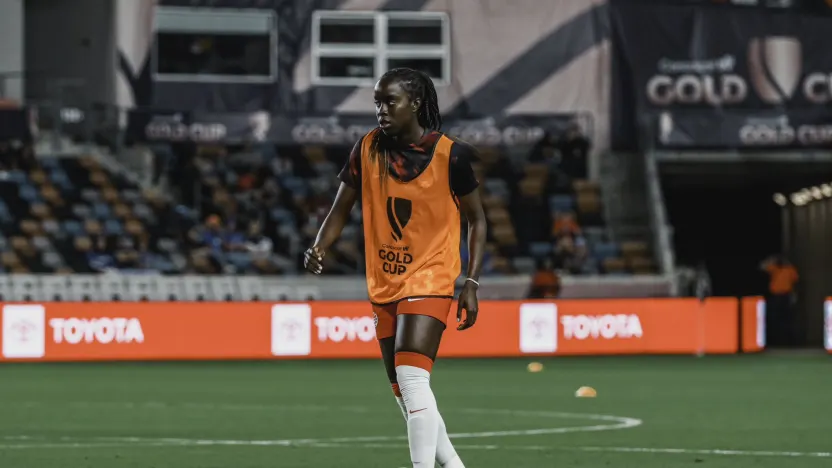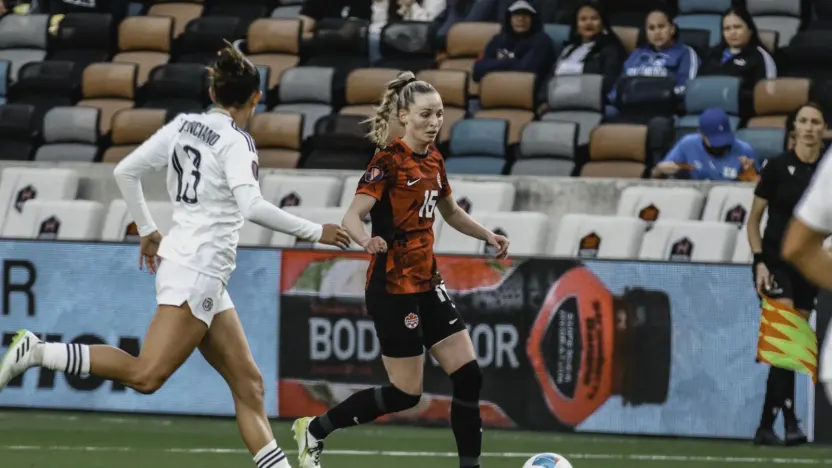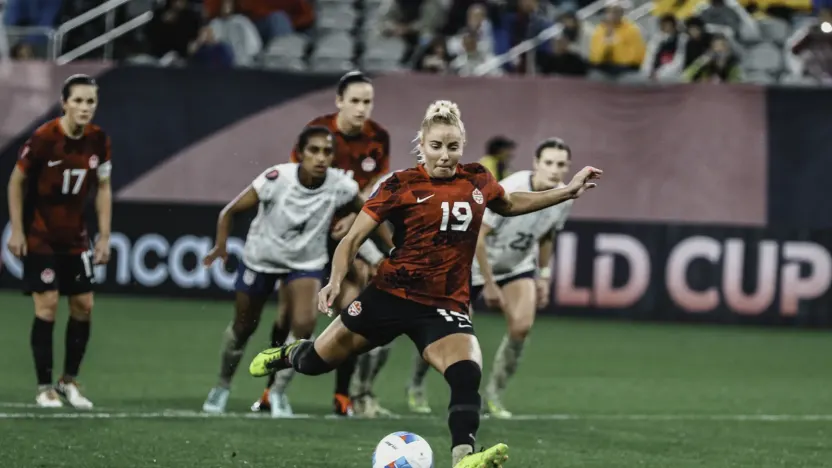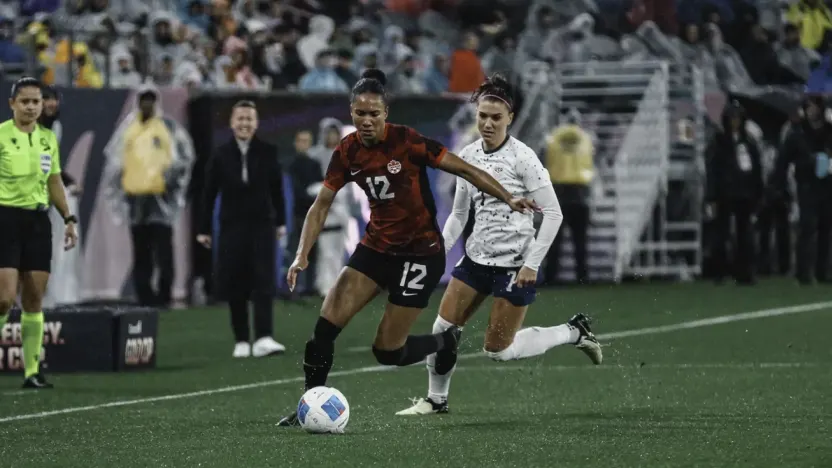Bev Priestman said that the Concacaf W Gold Cup was as much about winning a major trophy as it was about preparation for the Olympic Games this summer. While Canada fell just short of the first goal, losing to the United States in a semifinal shootout on Wednesday night, the performance of the team as a whole was a step in the right direction ahead of a few important months coming up. Canada kept a clean sheet in four of their five matches, adding sixteen goals of their own in a well-rounded tournament, albeit coming mostly against teams they were expected to beat. Canada was the top team in the group stage, entering the knockouts as the top seed, where they beat Costa Rica for the second time in a few days before the aforementioned defeat to the United States. Priestman has a selection dilemma ahead of the Olympics, needing to cut the squad down to just 18 players. Here are five players in particular who had a standout Gold Cup for Canada, and whose stock rose over the past two weeks.
Simi Awujo
In an expanded role for 20-year-old Simi Awujo, the young midfielder was Jessie Fleming’s partner in the middle of the park for much of this tournament, swapping starts with Quinn, and Awujo took the opportunity to get more minutes and ran with it. Awujo didn’t play in Canada’s opening match, a 6-0 win over El Salvador, but came off the bench to replace Quinn at halftime in the second one, a 4-0 victory over Paraguay. A strong performance from Awujo earned her the start for Canada’s third group game against Costa Rica, where she again impressed against a physical, defensive team. She returned to the bench for Canada’s quarter-final rematch against Costa Rica, again trading places with Quinn, but came off the bench in the 65th minute for a 55-minute shift as the match went to extra time. Finally, she got the start in Canada’s semifinal against the United States — the country she grew up in and represented at the youth level — where she played 56 minutes before Bev Priestman opted to bring on Jordyn Huitema and add an extra attacker to the pitch. Overall throughout the tournament, Awujo showed signs of maturity, continuing to grow into her role with the team. She can be the engine in Canada’s midfield that can get from box to box and contribute both offensively and defensively, and seemingly has the confidence and physicality to go head-to-head with any player she finds herself matched up against — making her a like-for-like replacement for Quinn throughout the tournament, and vice-versa. Awujo has never looked out of place with the senior national team since making her debut in 2022, but perhaps showed some inexperience at times. She took a step forward at the W Gold Cup, and if she can continue to play at the level she has to start the year, could very quickly become a starter in Bev Priestman’s best starting eleven — including at the Olympics this summer.

Gabrielle Carle
With three of Canada’s potential left wingbacks — Sydney Collins, Jayde Riviere, and Janine Beckie — all away from the team during the W Gold Cup due to injuries, and Allysha Chapman away after giving birth to her son Tavish in February, there was an opening on the left side of the pitch that needed to be filled, especially after Collins fractured her ankle during Canada’s pre-tournament camp. The player who stepped up into the role was Gabrielle Carle, who has long been a member of the national team, but has struggled at times to really solidify her spot in the squad. Carle was an alternate at both the 2016 and 2020 Olympics, eventually added to the latter side that won the Olympic gold medal. She initially missed out on the squad that went to the 2023 Women’s World Cup, but was added at the last minute as Jade Rose got injured, but Carle didn’t see a minute on the pitch. At the Concacaf W Gold Cup the 25-year-old defender rose to the occasion, starting four of Canada’s five matches and coming off the bench at halftime of the other one: the 4-0 win over Paraguay in the second group stage game. Carle played with fearlessness on the left side of Canada’s midfield four in a 3-4-3 formation, bombing up and down the wing. With Canada mostly playing on the front foot in this tournament, especially in the group stage, Carle got on the ball often, and served up some brilliant deliveries into the penalty area to set up several chances to score. Carle will likely get another call-up for the SheBelieves Cup next month, where Canada will play Brazil and one of Japan or the United States. If she can put up a couple of big performances, she could challenge for a spot on the Olympic roster, at least as an alternate player again.

Adriana Leon
For the latter stages of Christine Sinclair’s national team career, and since she retired from international duty in December, one of the lingering questions around the Canadian national team has been who will take the starting striker job and really make it their own. Adriana Leon staked a claim to that role at the Concacaf W Gold Cup, scoring six goals across Canada’s five matches and currently in pole position for the Golden Boot ahead of Sunday’s final between the United States and Brazil. At times Bev Priestman deploys Leon on one of the wings, where she is also effective but doesn’t get as many looks at goal as she would in the middle, which detracts a bit from her full skillset. Leon might be Canada’s best finisher at the top of her game, and in this tournament climbed to third place on the national team’s all-time goalscoring list, jumping over Kara Lang and Janine Beckie. Leon is also physical and never backs down from a duel, whether on the attacking or defensive side of the ball. Leon’s brace in Canada’s opening match against El Salvador and a hat trick against Paraguay got Canada off to a flying start in the group stage and played a factor in Les Rouges finishing as the top seed with a 3-0-0 record and tournament-best +13 goal difference. Leon was already an important player for Canada, but this tournament was a reminder that she is likely a locked-in starter and a focal point of Bev Priestman’s attack going into the Olympic Games this summer.

Jade Rose
Jade Rose has been on the cusp of becoming a regular starter for Canada for over a year now, and at the W Gold Cup seemingly locked in her spot in Bev Priestman’s best lineup and for the Olympic squad. Rose, who recently turned 21, started four of Canada’s five matches, at right centre-back on the right side of Priestman’s back three. She played the full ninety minutes in Canada’s first two group stage matches before getting the third game off, and then played the full 120 minutes in the two knockout matches against Costa Rica and the United States. She grew into the tournament, finding her groove after struggling to connect some of her passes in Canada’s opening game against El Salvador, and by the end was one of the best defenders in the tournament. She has the ability to both defend well and spring forward to help out the attack. Her passing range has also improved in recent times, and it was a perfect long ball into the box from Rose that led to American goalkeeper Alyssa Naeher fouling Vanessa Gilles in extra time on Wednesday night, setting up the match-tying penalty from Adriana Leon. Rose’s breakout came last year, but in 2024 she has a great opportunity to take another huge step forward and cement her place as a crucial starter for Canada for the next decade-plus.

Olivia Smith
In the future, followers of Canadian soccer will look back on the 2024 Concacaf W Gold Cup as Olivia Smith’s true breakout on the international stage. Smith, still just 19, made her international debut back in 2019 as a 15-year-old, but had to wait several years for another opportunity at the senior level, lighting it up with the youth national teams before surprisingly being added to Canada’s Women’s World Cup roster last summer after initially just going to Australia as a training player. At the W Gold Cup, Smith came off the bench during Canada’s opening match against El Salvador and made an immediate impact. She delivered several dangerous crosses into the box, including assisting Kadeisha Buchanan’s goal to make it 4-0, and later scored her first senior international goal with a great run into the box and calm finish to cap Canada’s 6-0 domination. A few days later, Smith scored for the second time in as many games, firing a shot for Canada’s second of four goals against Paraguay, and in Canada’s third group stage match assisted a Shelina Zadorsky headed goal with a well-placed corner kick into the penalty area. Concussion protocol kept Smith out of Canada’s quarter-final against Costa Rica, but she played the thirty-minute extra time period in the semifinal, showing some flashes of brilliance as Canada forced a shootout, but she would not get an opportunity to take one. Smith played well enough to put herself in the conversation for the limited 18-player Canada squad ahead of the Olympics, at least as one of the four alternate players beyond that squad, and can expect a bigger role going forward with the team.
